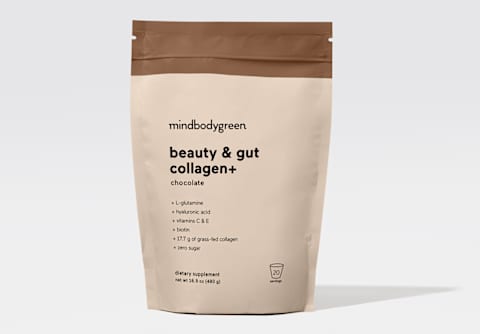Advertisement
Make Breakfast A Part Of Your Skin Care Routine With These 3 Ingredients


My daily skin care routine starts at 8 in the morning, and I'm not just talking about the serums or creams on my shelf but also breakfast. The first meal of the day is just naturally conducive to some science-backed ingredients for optimal skin benefits if you know what to choose.
To come, three go-to items to put on your plate for both complexion and full-body perks:
Grapefruits
We all know oranges to be a vitamin C powerhouse, but they actually have less of that essential nutrient than their pink cousin, the grapefruit. You can top your acai or yogurt bowl with a few chunks of fresh citrus, blend it into a smoothie, or have it as a side dish with an otherwise savory meal.
Why it's good for your skin
Vitamin C plays a critical role in the collagen synthesis process. "Vitamin C is a key cofactor in the synthesis of collagen and elastin, [which help] give your skin that plump and youthful appearance," dual board-certified dermatologist Keira Barr, M.D., told mindbodygreen. The nutrient also protects the collagen you already have by working against collagen-degrading enzymes1.
Vitamin C is a common gap in the American diet—in fact, 46% of U.S. adults2 aren't consuming adequate amounts of vitamin C. Whether you pick oranges, grapefruit, or even consider vitamin C supplements, you'll be doing your skin a favor in the process.
Tofu
Don't hate it before you try it—tofu can be a breakfast food too. Whether it's grated up into a tofu scramble (to replace or accompany egg), grilled for protein in a breakfast sandwich, or used to add plant amino acids to your smoothie, there are many ways to work it into your first meal.
Pro tip:
Why it's good for your skin
One study published just last year in the journal Nutrients found that dietary soy protein supplementation with isoflavones may improve skin photoaging3, including wrinkles and pigmentation concerns, and increase skin hydration in postmenopausal women.
In the skin, isoflavones and other phytoestrogens have been shown to increase hyaluronic acid concentrations and improve the content and quality of collagen—both of which decline naturally with age, contributing to drier, looser skin over time.
Collagen supplements
On the mornings you don't have time to prep an extravagant avocado toast, tofu scramble, or even slice a grapefruit, collagen supplements can check the "skin-loving" box. Find tasty powder options to make them more versatile, keeping them on hand to dress up any smoothie, yogurt bowl, chia pudding, or oatmeal dish.
When seeking a worthy supplement, look for hydrolyzed peptides for optimal absorption.
Additional ingredients like vitamins C and E or hyaluronic acid are a plus. Here, a carefully curated list of A+ collagen supplements to consider.
Why it's good for your skin
Collagen levels deplete with age, beginning in the mid-20s, decreasing by about 1% each year. Once you hit menopause, there's a significant drop in your collagen bank—a whopping 30%4. Maintaining collagen levels as you age can support skin elasticity5, hydration6, and even smooth the appearance of some fine lines.7 Even if you're not at the age of menopause onset, it's worth considering collagen supplements for preventive care and a protein boost.
The takeaway
Incorporating skin-loving ingredients into your morning routine can enhance your complexion from the inside out.
Consider starting your day with grapefruit for its vitamin C content, tofu for its skin-boosting isoflavones, or collagen supplements to support collagen production and maintain skin elasticity over time. Here, even more skin foods to add to your grocery list.
7 Sources
- https://www.ncbi.nlm.nih.gov/pmc/articles/PMC4112252/
- https://www.ncbi.nlm.nih.gov/labs/pmc/articles/PMC7352522/
- https://www.mdpi.com/2072-6643/15/19/4113#B10-nutrients-15-04113
- https://www.ncbi.nlm.nih.gov/pmc/articles/PMC2685269/
- https://jddonline.com/articles/oral-collagen-supplementation-a-systematic-review-of-dermatological-applications-S1545961619P0009X/
- https://www.ncbi.nlm.nih.gov/pmc/articles/PMC6073484/
- https://pubmed.ncbi.nlm.nih.gov/23949208/












